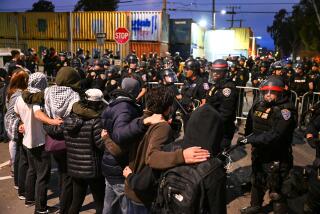Protests against grand jury decisions are especially vocal in Bay Area
- Share via
reporting from SAN FRANCISCO — Recent grand jury decisions not to indict police officers in the deaths of two unarmed African American men have triggered protests nationwide — but nowhere has the outcry been as persistent as in the Bay Area.
After a weekend of unrest, marchers gathered in Berkeley on Monday for the sixth straight night of street action since a New York grand jury last week found no grounds to prosecute the officer who applied a chokehold on Eric Garner.
Television stations here have streamed images of demonstrators climbing atop freeways, hurling rocks at California Highway Patrol cars and lighting small fires. An executive chef at a downtown Oakland wine bar was beaten over the weekend as he tried to fend off vandals smashing the plate glass windows, and a protester was struck by a hammer as he attempted to stop a fellow demonstrator from looting a Berkeley Radio Shack.
The previous week saw an equally virulent response to the decision against indicting former Ferguson, Mo., police Officer Darren Wilson in the death of Michael Brown.
Driving the protests is the Bay Area’s “strong, proud history of leading social justice movements … and of having strong leaders, from the Black Panthers in Oakland to the student movement on campus,” said Yvette Felarca, an Oakland resident and national organizer with the Coalition to Defend Affirmative Action, Integration and Immigrant Rights and Fight for Equality By Any Means Necessary, which has spearheaded the Berkeley events.
Unprosecuted deaths “are not new,” said Felarca, a 44-year-old teacher. “But what is new today is the movement that the people in Ferguson started and that is being answered and backed across the nation — and especially by us here in the Bay Area.”
Franklin E. Zimring, a UC Berkeley law professor, agreed that the protests’ staying power here stems from strong social organizing.
“If you were going to count the dead bodies from police violence, believe me Los Angeles has a clearer lead in the state of California,” he said, adding that officer-involved deaths in Los Angeles nevertheless are down from a peak three years ago.
But in what Zimring called “the irony of public protest 2014,” it is the most fringe elements who have captured the spotlight. “The message may be lost,” he said, “but the attention is focused on people who want it.”
Still, for many residents, the message resonates deeply. And as with the Occupy movement, social media have helped mobilize a broad cross-section to join in.
Yomi Wrong, 42, a disability rights advocate from Oakland, said she felt the effect of police violence when her unarmed cousin was fatally shot in the head more than a decade ago in the Bronx. Her aunt won a large civil settlement, she said, but there was no criminal prosecution and “no healing” for the family.
“I don’t know how I feel about Mike Brown as a person, but I don’t need there to be a perfect victim to know that poor communities everywhere — and especially communities of color — are under siege,” she said.
Wrong said she was nearing the end of her commute home from her job in Mountain View on Wednesday when her van rolled up to a group of young demonstrators who raised their fists. Many, like her, were African American.
“It was not just a gesture of solidarity. It was: ‘Come join us,’” she said. “And I thought, these young people deserve that, because they are who we are talking about.”
Wrong said she drove until she saw police in riot gear. Then she joined the protest, posting on Facebook and texting friends. Her Lutheran pastor, who is white, saw the posts, made a sign and joined the protest.
Their contingent remained largely peaceful, Wrong said.
“There were people even in our group who would knock down a trash can,” she said. “Somebody else would just pick it back up.”
Twitter: @leeromney
More to Read
Sign up for Essential California
The most important California stories and recommendations in your inbox every morning.
You may occasionally receive promotional content from the Los Angeles Times.











